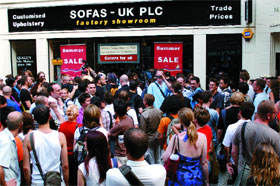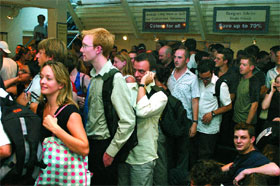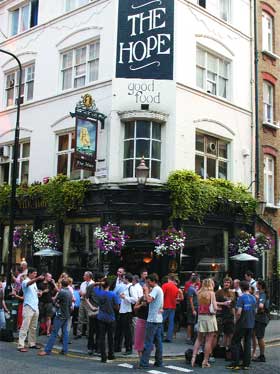"I understand they choose a shop and descend on it," Robinson said at 6:40 p.m. as the mob dispersed, also as instructed — anonymous e-mails summon these mobs to pubs where minions of the mob coordinator distribute further instructions on when and where to gather and when to leave. "I couldn't break the tradition."
Inexplicable mobs, or flash mobs, as they've also been dubbed, have become the social trend of the summer. Echoing back to '60s-era "happenings" or '70s-era Situationist art projects — except shorter and with even less purpose — these pseudo-spontaneous gatherings began in June in New York City, and spread quickly across America before making their way to Europe (Rome, to be precise) on July 24.
The mobs were the idea of Bill, a twenty-something New Yorker who says only that he works in the "culture industry." Bill doesn't want to be identified because he thinks that would detract from the mob's appeal. Interested in the social reasons people go to see performing arts, he began to ruminate on what would happen if the performance were taken out of the equation. So he invited the 50 people on his e-mail
|
|||||||||||||||||
| ALASTAIR DALY for TIME (3) |
On the list was Dan Goldstein, a psychologist at Columbia University and part-time performer. Goldstein (full disclosure: he's also my brother) has over 1,000 people on a Yahoo e-mail list called Sitcominfo he uses to promote his plays. He forwarded Bill's e-mail to all of them. The first mob didn't go entirely according to plan. Someone, later dubbed Squealer, tipped off the police who were waiting with a van outside the target, a Claire's Accessories shop. Nevertheless, 20 or so people made it inside and the mob was born. "The biggest shock is how it spread," says Bill. "Within days people started groups in other cities."
Now it has infiltrated much of Europe as well. So far, Dublin, Amsterdam, Zurich and Vienna have had mobs. But no European country has embraced the mob quite like Germany, where 20 cities have staged mobs. "Germans are not usually spontaneous and this gives them a frame for a moment of craziness," says Anne Urbauer, a journalist in Munich. "It's a short escape and it's not really dangerous."
For a pointless act, mobs have created a fair amount of serious analysis. Howard Rheingold, author of a 2002 book called Smart Mobs, thinks mobs are the newest form of social protest. "Smart mobs consist of people who are able to act in concert even if they don't know each other," writes Rheingold. Smart mobs have, he says, done things like help topple Philippine President Joseph Estrada. Do flash mobs have similar aspirations? Not according to Bill.
"I'm a political person," he says. "I do engage in protests, and I don't see this as a substitute." So if it's not social protest, what is it? London mobsters' reasons varied from boredom ("I get to do something interesting before going to the pub") to something grander ("It's about creating a community, but because it is London it only lasts [finger snap] that long").
How big can the mob movement get? Who knows? New York just had its sixth and there are plans afoot in Australia and Asia. And how will the mob project end? "Suddenly," Bill predicts, when the ideas for venues in New York wear thin. But judging by the reaction to the European ones — "I can't believe how satisfying that was," exclaimed a sweaty Phil Buckley-Mellor, 34, on his way out of the store — it looks as if we're in for an inexplicable autumn.



